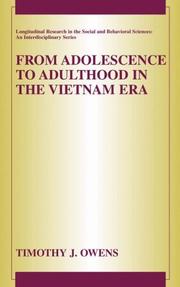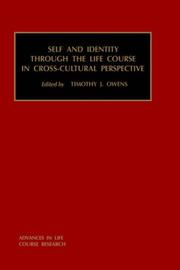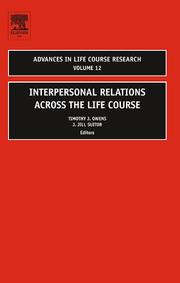| Listing 1 - 10 of 10 |
Sort by
|

ISBN: 1281167401 9786611167400 0387227873 0387227865 Year: 2005 Publisher: New York : Springer,
Abstract | Keywords | Export | Availability | Bookmark
 Loading...
Loading...Choose an application
- Reference Manager
- EndNote
- RefWorks (Direct export to RefWorks)
Children born during the post-WWII era of peace and prosperity entered history at a time dominated by I-Like-Ike politics and domestic security. As they approached adolescence, however, their world was shaken by major cultural, economic, social, and political upheaval. And although it was time of great innovation and progress, a sense of chaos and bitterness began to envelop the country. It was the ‘60s. For many Americans, a mere mention of this decade evokes an extraordinary time and place in the country’s - and their own - history. Adolescents who had been enjoying the technological and medical advances of the era - television, drive-in movies, rock-and-roll, vaccinations that prevented once-incurable diseases - now were also experiencing the fallout from the Civil Rights Movement, domestic terrorism, stagflation, and (perhaps most significant) the Vietnam War. From Adolescence to Adulthood in the Vietnam Era provides a unique, detailed, long-term study of the psychological and social worlds of male adolescents who were on the cusp of adulthood as the 1960s were ending. This longitudinal analysis follows adolescent boys who graduated with the class of 1969 and transitioned into adulthood either through military service, full-time employment, or college life. The results examine the different pathways these boys chose and the affect these choices had on their transition from adolescents to young adult men.
Young men --- Teenage boys --- High school graduates --- Vietnam War, 1961-1975 --- Adolescent boys --- Male adolescents --- Boys --- Teenagers --- Men --- Young adults
Digital
ISBN: 9780387227870 Year: 2005 Publisher: Boston, MA Springer Science+Business Media Inc
Abstract | Keywords | Export | Availability | Bookmark
 Loading...
Loading...Choose an application
- Reference Manager
- EndNote
- RefWorks (Direct export to RefWorks)
Developmental psychology --- Educational psychology --- schoolpsychologie --- adolescenten --- kinderpsychologie

ISBN: 0762300337 Year: 2000 Publisher: Greenwich, Conn. JAI
Abstract | Keywords | Export | Availability | Bookmark
 Loading...
Loading...Choose an application
- Reference Manager
- EndNote
- RefWorks (Direct export to RefWorks)
Social problems --- Sociology of minorities --- minderheden --- United States of America

ISBN: 0521630886 0521028426 051152773X Year: 2001 Publisher: Cambridge Cambridge University Press
Abstract | Keywords | Export | Availability | Bookmark
 Loading...
Loading...Choose an application
- Reference Manager
- EndNote
- RefWorks (Direct export to RefWorks)
Self-esteem is an academic and popular phenomenon, vigorously researched and debated, sometimes imbued with magical qualities, other times vilified as the bane of the West's preoccupation with self. Though thousands of articles have been devoted to the topic, and bookshops work to feed the public's appetite for advice on revealing, enhancing and maintaining self-esteem, conflicting claims and findings have placed the field in disarray. In a very real sense, self-esteem is a victim of its own popularity. This book seeks to add clarity to a concept earlier examined by such notable self theorists as Morris Rosenberg but eminently worthy of re-examination and extension. We do this by asking some leading thinkers on self-esteem theory, measurement and application to assess what we know about self-esteem, and link it to important aspects of society and the human experience.
Developmental psychology --- Psychology --- Self-esteem --- Self-esteem. --- Social aspects. --- Health Sciences --- Psychiatry & Psychology --- Self-love (Psychology) --- Self-respect --- Self-worth --- Respect for persons --- Narcissistic injuries
Book
ISBN: 9780387227870 Year: 2005 Publisher: Boston MA Springer US
Abstract | Keywords | Export | Availability | Bookmark
 Loading...
Loading...Choose an application
- Reference Manager
- EndNote
- RefWorks (Direct export to RefWorks)
Children born during the post-WWII era of peace and prosperity entered history at a time dominated by I-Like-Ike politics and domestic security. As they approached adolescence, however, their world was shaken by major cultural, economic, social, and political upheaval. And although it was time of great innovation and progress, a sense of chaos and bitterness began to envelop the country. It was the 60s. For many Americans, a mere mention of this decade evokes an extraordinary time and place in the country's - and their own - history. Adolescents who had been enjoying the technological and medical advances of the era - television, drive-in movies, rock-and-roll, vaccinations that prevented once-incurable diseases - now were also experiencing the fallout from the Civil Rights Movement, domestic terrorism, stagflation, and (perhaps most significant) the Vietnam War. From Adolescence to Adulthood in the Vietnam Era provides a unique, detailed, long-term study of the psychological and social worlds of male adolescents who were on the cusp of adulthood as the 1960s were ending. This longitudinal analysis follows adolescent boys who graduated with the class of 1969 and transitioned into adulthood either through military service, full-time employment, or college life. The results examine the different pathways these boys chose and the affect these choices had on their transition from adolescents to young adult men.
Developmental psychology --- Educational psychology --- schoolpsychologie --- adolescenten --- kinderpsychologie

ISBN: 1281037796 9786611037796 0080546196 9780080546193 9781281037794 076230863X Year: 2002 Publisher: Amsterdam London JAI
Abstract | Keywords | Export | Availability | Bookmark
 Loading...
Loading...Choose an application
- Reference Manager
- EndNote
- RefWorks (Direct export to RefWorks)
New Frontiers in Socialization
Socialization. --- Child socialization --- Children --- Enculturation --- Social education --- Education --- Sociology --- Socialization

ISBN: 128102659X 9786611026592 0080545165 9780080545165 0762307765 6611026592 Year: 2001 Publisher: Amsterdam New York JAI
Abstract | Keywords | Export | Availability | Bookmark
 Loading...
Loading...Choose an application
- Reference Manager
- EndNote
- RefWorks (Direct export to RefWorks)
Children at the Millennium
Child development. --- Children --- Child study --- Development, Child --- Developmental biology --- Social conditions. --- Development

ISBN: 0762307765 Year: 2001 Publisher: Greenwich, Conn. JAI
Abstract | Keywords | Export | Availability | Bookmark
 Loading...
Loading...Choose an application
- Reference Manager
- EndNote
- RefWorks (Direct export to RefWorks)

ISBN: 9780762312924 0762312920 Year: 2007 Volume: 12 Publisher: Amsterdam ; Oxford : Elsevier JAI,
Abstract | Keywords | Export | Availability | Bookmark
 Loading...
Loading...Choose an application
- Reference Manager
- EndNote
- RefWorks (Direct export to RefWorks)
Interpersonal relations. --- Families --- Parent and child. --- Relations humaines --- Familles --- Parents et enfants

ISBN: 0306477416 Year: 2003 Publisher: New York Kluwer
Abstract | Keywords | Export | Availability | Bookmark
 Loading...
Loading...Choose an application
- Reference Manager
- EndNote
- RefWorks (Direct export to RefWorks)
| Listing 1 - 10 of 10 |
Sort by
|

 Search
Search Feedback
Feedback About UniCat
About UniCat  Help
Help News
News